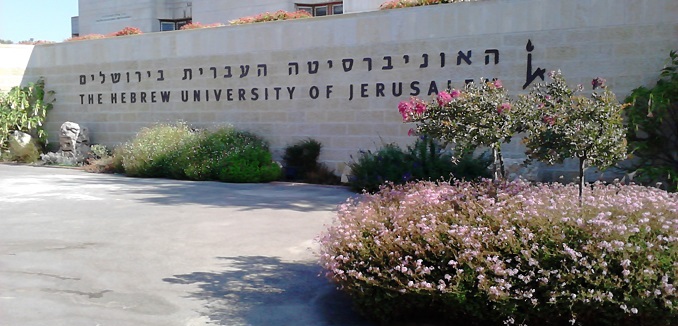The Middle East is the birthplace of many things, some positive, others less so. Amongst the region’s primary creations has been the postmodern idea that there is no real objective truth—simply competing “narratives” with equal claim and validity. But every so often the truth makes itself clear in the most unmistakable of ways for all to see. This is what happened last week at Hebrew University of Jerusalem, at an event promoted around campus on flyers bearing the intriguing headline “The Syrians Are Coming!”
Billed as the first public dialogue on Israeli soil between citizens of the country’s historic enemy, the event drew an overflow crowd of Israeli students who had come to hear directly from two Syrian opposition activists. “I’m humbled to stand before you as a Syrian, here in Jerusalem, and you know exactly what I mean,” Sirwan Kadjo, one of the activists, began his talk. No more exposition was required. Yet in the midst of all the good feeling and talk of a “new Syria” living in peace with Israel, some Arab-Israeli students did their utmost to remind everyone that there are those who prefer the old divisions, hatreds, and yes, “narratives.”
Kadjo, a Syrian-Kurdish journalist living in exile in the U.S., was joined in Jerusalem by Hisam Zaytoun, a Sunni exile in Germany originally from a village in the Syrian Golan, just across the border from Israel. Throughout the course of the event put on by the Harry S Truman Research Institute for the Advancement of Peace, both panelists called several activists both inside and outside their homeland on Skype.
One of these was Fahed al-Masry, the chairman of the National Salvation Front, a Syrian opposition party now folded into the larger, confusing mosaic of anti-Assad groups. “Shalom,” al-Masry began from his perch in Paris. “Our vision for the Israeli people…is a new Syria outside any regional conflict, focused on internal reconstruction and peace.” Such a Syria, he continued, would not provide a base from which groups could threaten Israel or any other neighboring country. “The security and stability of Israel,” al-Masry concluded, “was necessarily linked to the fall of Assad and his regime.”
It was this regime, Kadjo said in his presentation, that taught the Syrian people to view Israel “as the ultimate enemy” – a move similarly deployed within Syria itself, to sow divisions between “different regions and peoples.” Zaytoun expanded on the point, observing that for Syrians in his home region of the Golan it was now “very confusing…to see that our ‘enemy’ is helping us.” Indeed, across the Israeli-Syrian frontier, the Israel Defense Forces has been running a major humanitarian operation, providing basic foodstuffs and medical aid to the local population as well as moving several thousand injured Syrians to Israeli hospitals for further treatment.
As Israeli military officers made clear to me on multiple occasions over the past year, there were moral as well as strategic reasons for this largess: the “hearts and minds” campaign ensures that terrorist elements—whether Hezbollah, Islamic State, or the panoply of other jihadist groups active in Syria—do not end up dominating the border region with Israel. Both speakers, for obvious reasons, chose to downplay the major role that jihadist terror groups have assumed within the Syrian opposition movement.
Yet the carnage of the Syrian war, now nearing its seventh year and with an estimated half a million dead, was evident to most of those listening on attentively. The conflict was “bigger than Syria,” Zaytoun pleaded, “it’s international and the Syrian people can’t face it alone – we need the help of the international community.” This was, in truth, the central reason for the Syrians’ headline-making visit and the event itself: to speak, as he told the Israeli audience, “to you and through you to the rest of the world.”
This was apparently too much for a half-dozen Arab-Israeli students in attendance, who rose from their seats and began heckling the two speakers in Arabic, in some cases in extremely personal and vulgar terms. “The enemy of your enemy isn’t your friend, look what’s happening in Gaza, in Palestine,” one girl shouted. “You should be giving voice to the voiceless, and not the Israeli occupation,” another one yelled. The organizers of the event tried to reason with the protestors, imploring them to “respect our guests – they’ve come from a long way, and they and their families have risked a lot, including their names.” The protestors were not dissuaded. The two Syrians, after initially holding back politely, responded in kind.
“You’re living in paradise, while the Syrian people are being butchered,” Zaytoun yelled back, to furious applause from the vast majority of the crowd. Commenting on the disturbance, Kadjo observed that the Arab students should “live in Syria for one day, and they would have a different opinion,” which was apparently too much for them to handle – the yelling started up again.
“The fact that you’re criticizing me right now,” Kadjo responded calmly, “means that you live in a functioning democracy.” The demonstrators were eventually escorted out, to without doubt continue their studies—and protest—another day. In the meantime, their peers in Syria are simply focused on staying alive. No alternative narrative should be required to see this as objective truth, and nothing short of a tragedy.
Neri Zilber is a journalist and researcher on Middle East politics and culture, an adjunct fellow of the Washington Institute for Near East Policy, and a research associate of the Rubin Center at the IDC Herzliya. You can follow him on Twitter @NeriZilber.




